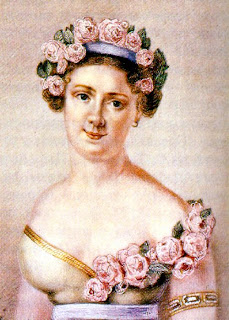(12 November Old Style)
One of the first articles I wrote here mentioned Avdotya Istomina, famous ballerina. Here's a story where she became the cause of one of the most famous duels in Russian history.

1817
Istomina was eighteen and she was beautiful. Well, you see her portrait and it would be better to say that she was considered beautiful, for some reason. Like many other eighteen-years old beauties, she was frivolous, puerile and a little bit cruel. By that time she had been living with 21-years old captain of cavalry of the Horse-Guardsmen Regiment Count Vasily Sheremetev. Sheremetev was hot-tempered and jealous. On 3 November 1817, Avdotya left him and moved to live with Maria Azarevicheva, her good friend. What caused this break-up is not known. Perhaps, it was just another scandal. She told later that she had planned to leave him for a long time. Rumors said that the young count was running out of money. On 5 November, one of her numerous acquantances, Alexander Griboyedov (the author of the magnificent play Woe From Wit), after an evening in the theatre, offered her to visit his good friend, Count Shakhovsky, who had something to do with the show business (the theater, ballet, and so on). Instead, he brought her to his friend Count Alexander Zavadovsky, kammerjunker (Gentleman of the Bedchamber). Griboyedov explained later that he just wanted to find out what happened between her and Sheremetev, but since he lived at Zavadovsky's, it was the only place where they could talk, and Zavadovsky arrived later.
When Zavadovsky came back, he, an egotistic playboy, thought that, of course, she must have come to see him. Later, during the investigation, Istomina confessed that during this evening Zavadovsky had offered her his love, but she didn't know whether he was serious or not. Something went wrong, so she left disappointed Zavadovsky and Griboyedov took her back to Azarevicheva's apartment. Soon Sheremetev came there, begged her to pardon him for his jealousy and then they departed to Sheremetev's. When they came back, though, he started inquiring where she had been, with whom, what did they talk about and what did they do and so on. When he finally learned that she payed a visit to Zavadovsky, he went mad. His friend, cornet of Life-Guard Alexander Yakubovich, being just as zippy as Sheremetev, convinced Sheremetev that Griboyedov was also guilty, that he had played the role of a pander in this affair. Yakubovich also told later that the cause of the duel between Sheremetev and Zavadovsky was some ungentlemanlike act of Zavadovsky, but refused to tell what it was, saying that he promised to Sheremetev not to disclose this matter.
On 9 November, at 4pm, they came to Zavadovsky and challenged him to shoot right now. Zavadovsky asked them to wait for a couple of hours, because he hadn't yet had his dinner, so they decided to postpone the duel to tomorrow, 10 November. Friend of Zavadovsky, second lieutenant of artillery baron Stroganov tried to reconcile the duellists, but failed. On the next day the place for the duel was not yet agreed upon, so they postponed all deaths till 11 November. On 11 November, it was snowing and windy and the duel was delayed again. On 12 November they came to the Volkovo cemetary. The distance was 18 steps and they agreed that the one who shoots first will have to come to the barrier in the middle.
Sheremetev, annoyed by Zavadovsky's lentitude, shot first, but the bullet only tore away a piece of Zavadovsky's collar. Sheremetev cursed and said that if Zavadovsky would miss, they will shoot again. Zavadovsky took aim for a long time, then his pistol misfired, then it misfired again, and finally he shot. The bullet hit Sheremetev in the belly. The duel between Yakubovich and Griboyedov was postponed and they took wounded Sheremetev to his home where he died on the next day.
Sheremetev's father asked emperor Alexander not to punish Zavadovsky. The emperor gave an audience to Zavadovsky and concluded that it was a lawful self-defense.

Playboy Zavadovsky was sent away from Russia. Yakubovich was arrested and transferred to Caucasus. Griboyedov was also sent away from Russia. He was offered a choice: he could join the Russian embassy in the USA or in Persia. He chose Persia. On his way there, in Tiflis, Griboyedov met Yakubovich and the postponed duel took place. The bullet of Yakubovich hit Griboyedov into his palm, damaging forever his pinkie. "At least, he'll stop playing piano", said the implacable Yakubovich.

Griboyedov became a good diplomat, he often came back to Russia and then returned to Persia to continue his work. In 1828, on his way from Russia to Tehran, he stopped in Tiflis again. There he met the beautiful Georgian duchess Nina Chavchavadze, daughter of his good friend, poet Alexander Chavchavadze, and fell in love with her, just like she did. They married and the happy couple went to Tehran. A week later Nina stayed in the city Tavriz on the border and Griboyedov went forward to prepare his apartments for the arrival of his lady.
There was an Armenian eunuch in Griboyedov's retinue, Mirza Yakub, and the rumors said that he planned to convert from islam to christianity. The leaders of the Tehran muslims decided to kill the apostate. The fanatics attacked the Russian embassy and killed everyone there. The body of Griboyedov was identified by the mutilated pinkie.
More about Griboyedov in a small, but well written article by Philip Henscher in the Spectator: The playing fields of Persia, review of "Diplomacy and Murder in Tehran: Alexander Griboyedov and Imperial Russia's Mission to the Shah of Persia" by Laurence Kelly
 add to del.icio.us
add to del.icio.us









